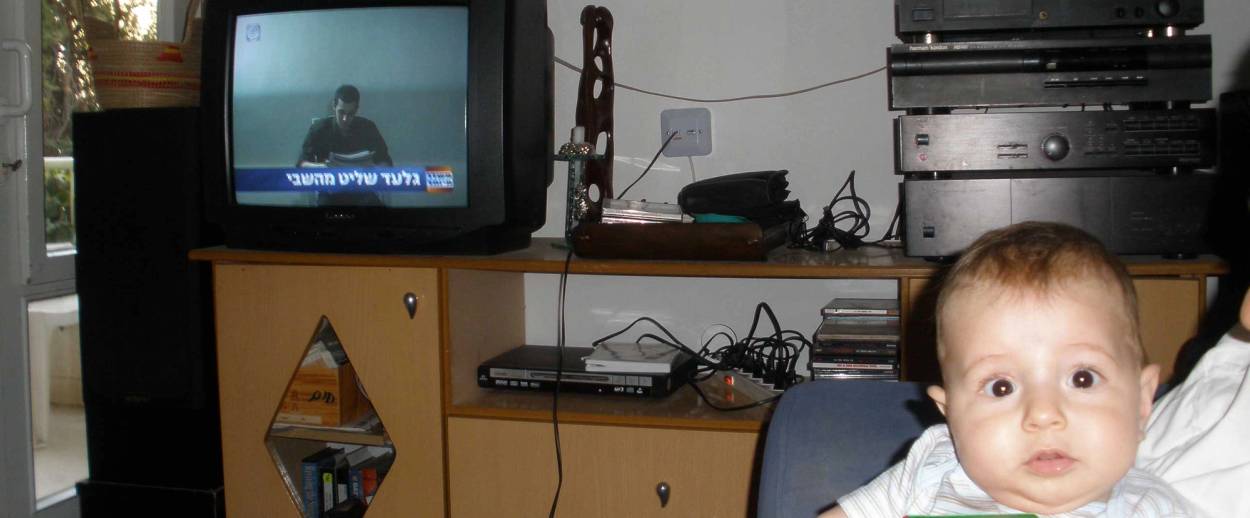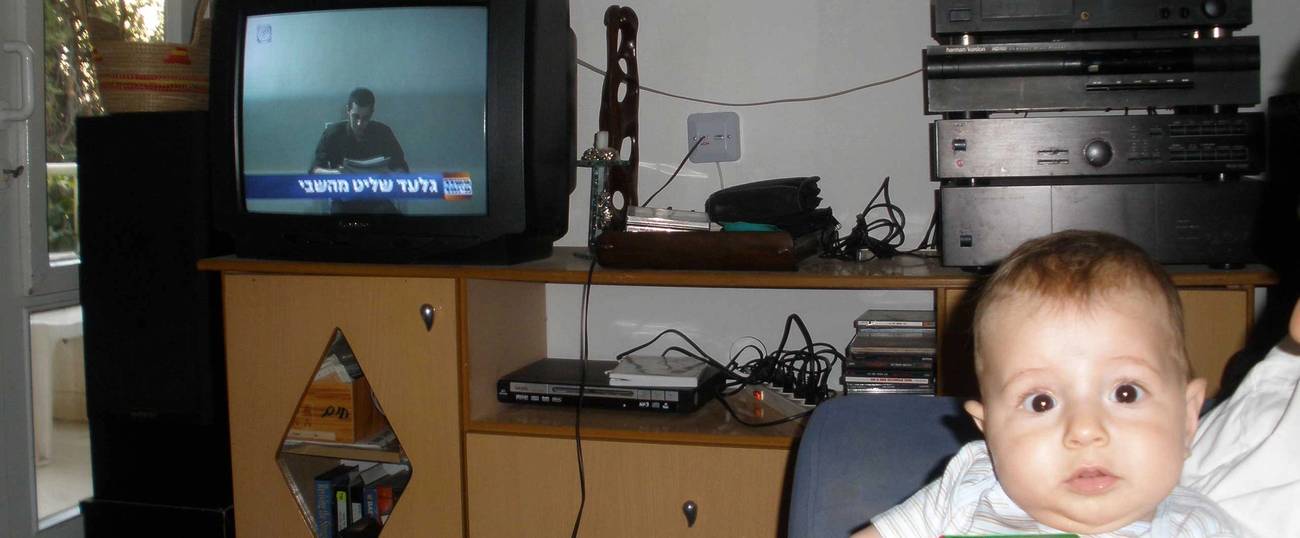Lessons From the Mother of a Kidnapped Soldier
What I learned about maternal love from Aviva Shalit, whose son Gilad was held prisoner in Gaza for five years




In Israel, where most citizens are conscripted at age 18 and wars and kidnappings are a constant threat, motherhood is a mercurial experience. As a new immigrant, my induction to motherhood was shaped irrevocably by another Israeli mother, Aviva Shalit, whose son Gilad was held prisoner in Gaza from 2006-11.
In the years following the abduction, my husband and I lived minutes away from the Shalit protest tent next to the prime minister’s residence in Jerusalem. The white makeshift structure, manned by volunteers and decorated with homemade banners, was designed to make Ehud Olmert and then Benjamin Netanyahu think of Gilad every time they left and returned home. The Shalits and their tent became fixtures in our lives.
Negotiating the freedom of kidnapped soldiers is an explosive issue in Israel. Based on precedent, the price of a live Israeli soldier is grossly disproportionate, and many of the Palestinian prisoners released in these exchanges return to terror activities. But Gilad was believed to be alive; the Shalits did what any parents would.
My fascination with the Shalits intensified when I was pregnant with my oldest son. I found Aviva especially intriguing because she brazenly flouted the rules of Israeli motherhood. In a place where aggressiveness is not only a valued trait but a survival skill, Aviva dared to be timid. At first, she repudiated the media, while her husband, Noam, took the helm of the fight. How could she survive this? I asked myself every time I saw her sheepishly hiding behind Noam or her older son. She plainly wanted to hibernate until Gilad came back.
Among the many cultural codes and nuances I was absorbing at the time was the matriarch’s central role in Israeli society. I was well-acquainted with strong Jewish mothers in the Diaspora, but Israel takes the concept a few steps further.
There’s the good: the concerned looks and smiles you receive everywhere when you’re pregnant, the universal love for children, the way everyone—even strangers—spills their birth stories and parenting advice. Israeli mothers command respect, period.
Yet, this sacred role has a dark side, too. Because Israeli mothers bear the soldiers who defend our eternally threatened state, we are groomed to use our most visceral instincts to wrest our children from danger—at all costs. Like the mothers of kidnapped soldiers before her, Aviva was expected to ferociously lead the battle to bring her son back.
Many pundits criticized the Shalits, and especially Aviva, for not being pushy enough; if they had been more resolute from the beginning, their son wouldn’t be in Gaza anymore.
I could identify with the Shalits’ reluctance to be aggressive. As a Canadian, I was raised to be polite and respectful. Chutzpah was not in my lexicon. I admired Israelis’ assertiveness but couldn’t muster enough for myself. I was often treated like a freier, the ultimate Israeli sucker. I stood helpless when people pushed in front of me in line; instead of arguing for a better deal, I walked away. I didn’t yet know how to manipulate the system, how to act Israeli.
As new life grew inside me, I wondered how my disposition, like the Shalits’, would affect my motherhood. Would I be a good enough mother? Did I have the pluck to defend my children from the unimaginable? When I tried to suppress these thoughts during the day, Aviva and Gilad haunted my nights. I dreamed that Gilad came out of hiding from the neglected bomb shelter next to our apartment building. I dreamed that a pregnant Aviva sat on our balcony, waiting.
So I joined the Shalits in waiting. Where would I be when Gilad returned? Would my child arrive before or after? What if he didn’t…? I always stopped there. For Aviva’s sake, I had to be hopeful.
On Purim 2009, I was nine months pregnant. My husband and I walked around town, gleefully drinking up the atmosphere in our last carefree days before parenthood. On our way home, as always, we passed the tent.
Amid the festivities, Aviva sat in her cloud of grief. Cowboys, queens, Spider-Men and scantily clad girls milled about, taking advantage of the permissiveness that pervaded conservative Jerusalem during the holiday. I was dressed as a chicken sitting on an egg. (Picture: chicken hat from a bar mitzvah with an orange shirt pulled up above my belly, a white shirt underneath, and a homemade nest of real branches all around.) For Aviva, the pageantry didn’t change the fact that her son was locked up somewhere, and she had no power to rescue him.
For the first time, I gathered my courage and joined the line to greet her. As I moved closer, I grew anxious. What to say? Unlike at a funeral, there were no predetermined rituals or blessings for a kidnapped son.
Aviva stared at the flimsy roof. It barely shielded her from the oppressive sun but she didn’t seem to notice. She vaguely nodded as people uttered things at her. She never smiled.
I stepped forward.
“Chag sameach,” I said.
She looked at my egg/belly.
“Hmmm…”
“I hope your son returns soon,” I blurted. “Before mine comes.”
She nodded and looked away.
Our son Amitai was born on the 1,000th day of Gilad’s captivity. As I recovered in the hospital, I saw a photo in the newspaper of the solemn ceremony the Shalits held at their tent.
As Amitai grew, I saw us in parallel to Aviva and Gilad, a mother and son like any other—the one difference being that I could hug mine and she couldn’t.
A few months later, in October 2009, our small family waited impatiently with the rest of the country to watch the only video of Gilad released during his captivity. Pale and gaunt, he read the date from a Palestinian newspaper and held it up to prove that the recording was recent. I photographed a chubby baby Amitai with Gilad in the background. It was my security deposit. If I captured it for our family history, maybe it would influence Gilad and Aviva’s family history.
Months passed. Gilad didn’t return. The Shalits’ campaign was not working. Public criticism of Noam and Aviva became more vociferous. Something had to change.
Whether she made the realization herself or her advisers told her to do it, Aviva was forced to leave the comfort of her shyness. Only a maternal voice would shift public opinion, the commentators seemed to say. The Shalits adopted a more emotional, explicit tone. Aviva joined Noam in high-profile appearances. I remember one of her first solo TV interviews. It was excruciating for her and the viewers.
In the summer of 2010, the whole Shalit family marched from their home in the North to their protest tent in the capital. They vowed not to leave their tract of Jerusalem pavement until Gilad came home. I attended the welcome rally with Amitai. Now a babbling toddler, Amitai fidgeted cheerfully in his stroller, oblivious to the solemn event surrounding us. He munched on baby cookies as Noam and others tried to energize the crowd.
Watching Aviva on stage, I realized that motherhood compelled you to do things you didn’t want to do. It was a turning point for me; at that moment, I understood that you couldn’t get anything meaningful done in this country without being hyperaggressive. How much free choice did Aviva have? What would I do in her situation? How much should society dictate how one acted as a mother? How much was my motherhood my own?
I had left my comfort zone so many times in the year since Amitai was born, often cringing at Israelis’ lax approach to parenting, which was so different from my strict North American upbringing. No, I didn’t trust that random woman to pick up Amitai, and, yes, everyone who holds him must wash their hands first (doctor’s orders)! Was it me or was it Israel? I often second-guessed my instincts. In retrospect, I realize that Aviva may have grappled with similar issues, though in an extreme situation.
In October 2011, when Gilad finally stepped onto Israeli soil, only Noam met him. He led Gilad to a private room where Aviva waited. Good for her, I thought. She had to sell her soul to get her son back but she resisted enormous pressure for a public reunion. She kept that precious moment to herself.
Finally, after all those years, she could smile. I smiled, too. In a country where weakness is the ultimate vice, Aviva rebelled against Israel’s most revered social mores. To me, she’s a hero.
Six years after Gilad was freed, I think about Aviva often; she taught me valuable lessons as a mother. She showed me that you often have to leave your comfort zone. As much as she was thrust into a mold that didn’t fit her, she found a balance between doing what society wanted and what she wanted. This lesson resonated with me as I found my footing in a new and volatile country. In her final move in the spotlight, she had the last word: meeting Gilad alone. That, to me, is a metaphor for motherhood. Sometimes you bend out of shape and compromise for the benefit of your children, but ultimately you do what you feel is right.
Melanie Takefman has written for The Jerusalem Post, The Forward, and Haaretz, among other publications. She is writing a book about identity and belonging in Israel.